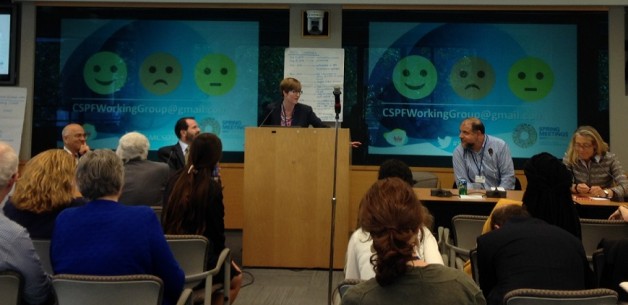Last week, BIC and Oxfam co-hosted a high level panel alongside the World Bank/IMF Spring Meetings aimed at confronting one of the biggest changes in the power dynamics surrounding the World Bank since its founding: the rise of populism. “The World Bank in an Age of Populism” featured distinguished speakers—Caroline Anstey, Ray Offenheiser, Alex Their, Masood Ahmed, and Shawn Donnan—debating the causes of populism and its implications for development. The panelists responded to questions intended for quick, deep dives into some of hottest topics at this year’s Spring Meetings for IFI folks and bank watchers alike, including: populism as a development issue, the shifting political dynamics between countries and IFIs, and the implications of populism for civil society, citizens and communities. Some of the main takeaways from this fascinating discussion include:
- Sentiments driving populist movements are legitimate, and have been building for decades
The panel generally agreed that rising income inequality and the lost confidence in governments and institutions is driving populist surges around the world. There was a great deal of discussion around the growing disconnect between the priorities of the Davos Man/Woman and reality as experienced by almost everyone else. This disconnect, according to Offenheiser, is fueled by the increasing “interconnectedness of the elite that allows them to relate to each other across boundaries, often informally, rigging the rules in their favor” along the way.
In addition to the widening gulf between the elite and others, it is the pace of change, Ahmed pointed out, that is spurring populist movements. The rapid expansion of the global economy has left many behind, and little attention has been paid to facilitating their participation.
Panelists acknowledged that populist backlash against a disconnected elite should not necessarily be seen as a “new” phenomenon, but over the past few years has had a wider impact on global politics and now “threatens” the global political order and faith in multilateralism generally.
- The development community needs to challenge some longstanding assumptions
In response to questions on how the IFIs should adapt to this new environment, panelists raised several provocative questions, challenging development orthodoxy on issues like inclusion, the role of civil society, human rights, and the value of multilateralism generally—including whether multilateralism deserves a wholehearted defense at all.
Should the post-World War II humanist vision be revisited?
Are the institutions that were originally created to rebuild Europe after World War II even fit for purpose?
Has the development community been taking the value of multilateralism for granted?
 It was pointed out that the narrative pushed in the 1990s around “the death of the state” had been grossly exaggerated. And shrinking space for civil society occurring simultaneously to the rise in populism is no coincidence—instead it reflects a deliberate effort by the state to claw that space back.
It was pointed out that the narrative pushed in the 1990s around “the death of the state” had been grossly exaggerated. And shrinking space for civil society occurring simultaneously to the rise in populism is no coincidence—instead it reflects a deliberate effort by the state to claw that space back.
Responding to development challenges in this environment—and defending multilateralism—with the traditional development narrative is no longer possible as populism delegitimizes experts and questions facts. People are turning away from institutions and supporting authoritarian leaders, some panelists suggested, because they seem to be offering solutions to deal with very real problems.
- The IFIs must change course to remain relevant
The panelists made clear that the issues driving populism such as inequality and exclusion are not going away anytime soon. And if the past is any indicator, the pace of change is likely to accelerate and further exacerbate the situation. “Development needs to be responsive,” stated Their, including by: updating the approach to inclusion to concentrate on the bottom 20%, rethinking the social contract, emphasizing local ownership, and a greater focus on fragility.
According to all of the panelists, communication is key to addressing these longstanding issues, but there is also a need to rethink how it is used—more communication, according to Anstey, “may just show the emperor has no clothes.” As Ahmed pointed out, “we need to see communication as a policy tool.” And, added Donnan, there is a greater need for “listening rather than telling.”
Panelists also emphasized that the drivers of populism are global—impacting people in the north and south, developed and developing countries, and that IFIs should consider expanding the focus of their work to address common issues around the world.
In some ways, the panel posed more questions than answers, but was effective in challenging all stakeholders—civil society actors, thought leaders, elites, and institutions—to consider their roles in addressing the drivers of populism—and examining whether and how they may be part of the problem. The prevailing development model clearly needs to change to ensure it fosters a sense of participation and upholds core values, including fairness. The IFIs have a role to play, but must act quickly to ensure they are part of the solution rather than problem.

